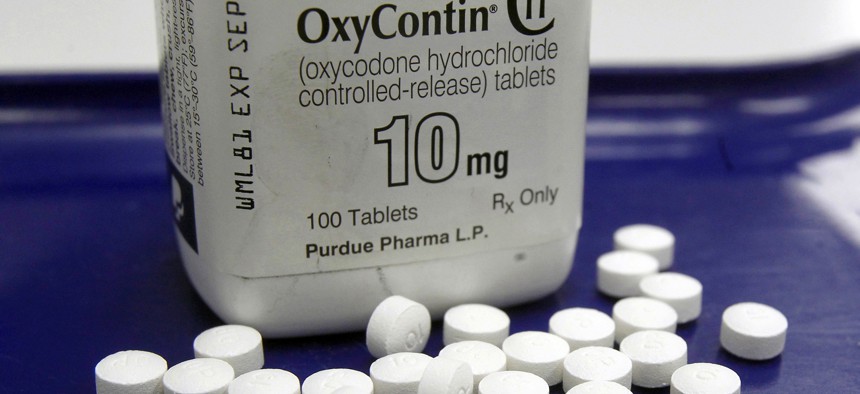New York Tax On Opioid Drug Makers Revived By Federal Appeals Court

This Feb. 19, 2013, file photo shows OxyContin pills arranged for a photo at a pharmacy in Montpelier, Vt. Purdue, the maker of OxyContin, is facing about 2,500 lawsuits seeking to hold it accountable for the opioid crisis. AP Photo/Toby Talbot
A ruling by the 2nd U.S. Circuit Court of Appeals overturns a lower court decision that axed a state tax that would require drug companies to pay hundreds of millions to help cover the cost of the state’s response to the opioid epidemic.
A federal appeals court this week granted New York state permission to implement an opioid tax on the manufacturers and distributors of prescription painkillers in a ruling that will enable the state to collect hundreds of millions of dollars.
New York approved the Opioid Stewardship Act in 2018, which required all pharmaceutical manufacturers and wholesalers who sell or distribute prescription opioids in the state to collectively pay $100 million a year. The amount to be paid per company would be determined by the market share of sales.
But associations representing pharmaceutical drug companies sued the state. A federal judge struck down the law, ruling that it ran afoul of a provision of the U.S. Constitution that prohibits state regulation of interstate commerce.
The 2nd U.S. Circuit Court of Appeals overturned that ruling Monday, finding that the state legislature “is entitled to require an industry to pay a tax to support public programs designed to address a widespread problem caused by the industry.”
The Opioid Stewardship Act required drug companies to pay $100 million annually for six years, with the money earmarked for programs that would help combat the opioid epidemic, including drug treatments, recovery, prevention and education services. Lawmakers amended the law in 2019, creating a different tax system for prescription opioids, so the court ruling indicates the payments would only apply to opioid sales made through Dec. 31, 2018.
The opioid epidemic cost New York $200 million in 2017 alone, according to the litigation.
An estimated 130 people die every day in the United States from opioid-related overdoses, according to the Centers for Disease Control and Prevention. And thousands of cities, counties and states have sued drug companies in an effort to recoup losses from battling the opioid epidemic.
While some have reached multi-million dollar settlements with drug companies, negotiations are ongoing in a sprawling multi-district litigation, which consolidated lawsuits filed by more than 2,000 local governments.
As litigation against drug companies drags on, states have begun to pursue other avenues—like opioid taxes—to collect money to help pay for drug abuse treatment.
In Delaware, a per-pill tax on prescription opioids that was adopted in 2019 had generated almost $1 million as of March. Minnesota lawmakers passed legislation last year that levied an annual $250,000 registration fee on drug manufacturers that sold or distributed more than 2 million opioid pills. The first registration fees were due in March.
Rhode Island also approved an Opioid Stewardship Fund that assesses a $5 million yearly fee to manufacturers and distributors who sell opioid products in the state.
The Healthcare Distribution Alliance, one of the associations that sued New York over the law, said they were disappointed in the ruling.
“At this time, we are in the process of further evaluating the court’s judgment and assessing our legal options in response,” said spokesman John Parker.
The alliance has been critical of the notion of states adopting opioid taxes, noting that they will not reduce the supply of prescription opioids on the market. Instead, the group argues the taxes will just inflate healthcare costs.
Tax policy experts have also cast doubt on whether opioid taxes would discourage the use of prescription opioids.
“A tax-driven price increase might be intended to reduce opioid abuse, but it would impose unwarranted costs on those who legitimately need the drugs,” wrote Howard Gleackman in a blog post for the Tax Policy Center.
As opioid-prescribing has slowed down in response to greater scrutiny of the industry, many of those abusing opioids have turned to illegal drugs such as fentanyl or heroin. Prescription opioid taxes would therefore have no effect on illegal drug users, but instead could increase the cost of prescription painkillers for people who have a legitimate medical need for them, warned a 2019 report from Women in Government.
Andrea Noble is a staff correspondent with Route Fifty.
NEXT STORY: Governors Plead with Congress for Help as Senate Rejects Skinny Relief Bill





